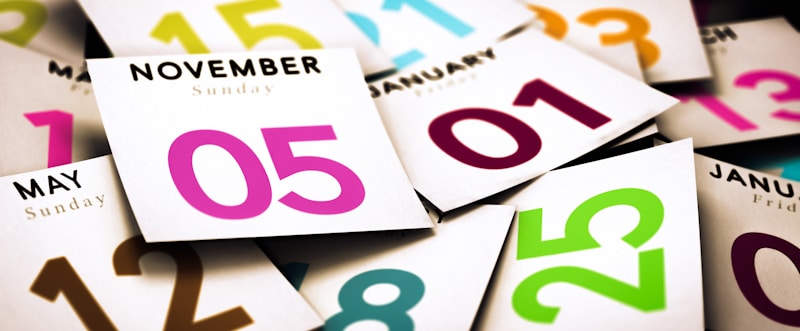Dates are important. They provide an irrevocable stamp to an event that happened or will come to happen with the same mathematical accuracy that time itself requires to function. Months are vital components of a punctual date, so what happens when it is jotted on a page? Which grammatical rules apply it, and must we capitalize them?
Months are proper nouns; as such, they are always capitalized. Proper nouns are uppercased because they have a particular meaning. Each month’s name is used to mean a particular time that is not equated with any other. There are twelve months in a year, but there is only one September in it.
Why Are Months Proper Nouns?
Regardless of where the month name is placed in the sentence, it must be capitalized to connote the weight it carries, without exception. They represent 1/12 of the year or about 30 days, and that is no small responsibility. Because of this duty, they are considered proper nouns as their meanings belong to a single and particular thing, idea, or person.
Coincidentally, the other instance where a month name could be employed without referring to a particular time of the year is as a proper name for a person. For example, the name January Jones. January does not mean the first month of the year on this occasion, but it is a proper name and, therefore, a proper noun that should be capitalized on every illustration.
Despite there being twelve months, April is the only name that the fourth month of the year carries, and its use is nearly exclusive to this purpose.
Are Days Capitalized?
Day is another element of dates that can be viewed similarly. There are seven days a week, but each has a name to imply their respective standings within the week. Thursdays are always capitalized whether they are not the first word in the sentence or are conjugated in the plural.
Holidays also have this particular distinction because, just like months and days, they mean to bring us to a specific and unchanging time within the year, such as Thanksgiving, Christmas, and Hannukah. As a consequence, they must always be capitalized regardless of where they are located in the sentence.
What Is A Proper Adjective?
Nouns name a place, person, or thing, so proper nouns mean establishing the uniqueness of a specific noun and its uses. On the other hand, adjectives modify nouns, and they point to add qualities to nouns such as old, blue, or ugly. They are often just referred to as the words we use to describe. So, you may be asking yourself, how can an adjective be proper?
An adjective can become proper when it derives from the proper noun, and this is evident in the names of buildings or monuments such as the Statue of Liberty or the Golden Gate Bridge. Notice how the prepositions are not capitalized, but we are forced to uppercase the proper nouns such as “statue” or “bridge” when referring to these particular infrastructures. These words alone are common nouns since there are many statues and many bridges around, but there’s only one Golden Gate Bridge and one Statue of Liberty. Therefore we must capitalize them to imply their singularity.
Are There Other Examples Of Proper Adjectives?
Another similar instance of proper adjectives would be the adjective president. President is followed by a proper name such as Biden, thus giving us President Biden. When we use an adjective like this, it should be capitalized. The Mr. acronym word for Mister in phrases like Mr. President or Mr. Biden also follow the same set of rules.
There are many examples of proper adjectives, and most of them refer to a place. Mount Everest, the Atlantic Ocean, or Fifth Avenue are all words that could be dissected separately as common nouns. Still, when within the context of providing directions or scheduling a date, we must give these words the significance they deserve by capitalizing them.
These examples include places or landmarks that are closely connected by the concept of time that months and days are trying to preserve and adhere to. Because, after all, what is time without place? Would I be successful in summoning you to a meeting if I were to refer to March 10th, 2022, at 3:50 PM without also providing a place to link it to?
These crucial gears are interlaced and awarded the properness they are entitled to by being capitalized when written. Because of their rightful importance is that I can easily invite you to a party I am hosting on April 26th, 2022, at 11:30 AM at the Grand Cayon’s main entrance.
Similar: Do You Capitalize Labor Day?
Of course, if I were making a formal invitation using the traditional style of writing, then I would opt to write the numbers using words only. For example, “this April 26th, two thousand and twenty-two,” but even then, the month will always be capitalized, and this is non-negotiable.
Nevertheless, by harnessing the importance that capitalization grants, we can accurately cite time and place in the way that we can. There are many statues but only one Statue of Liberty and, without capitalizing these particular words, we would have a considerably more challenging time referring to them when we write.
Capitalization signals the uniqueness required to tie together a written reference to a proper noun and proper adjective that intends to direct us to a specific time, place, or person.
Are Seasons Also Capitalized? If So, Why?
Now, capitalization used to refer to time is not without its exceptions. Seasons like summer, winter, and spring also cite specific periods during the year no different than months, perhaps, but they do not carry the distinction of being capitalized.
The seasons of the years are categorized as common nouns and are not allowed to be capitalized. For example: “My favorite season is summer.” Summer covers a much broader ground than the month of May, for instance, but it is still a modestly valuable word to cite us to a particular time within the year.
We can get away with capitalizing if it were to become a proper noun by being a proper name. Summer is, of course, a very popular name and a personal favorite, might I add. Autumn is also a good example. Though there is an exception that is more obscure, namely, using the word as a creative tool in poetry. By personifying the winter as an entity more than just a season, we can speak of it with the qualities of a proper noun, and this is no different than just using it as a proper name for a person.
Final Thoughts
Months are essential in their functions. We wouldn’t be able to recall historical dates such as the fourth of July or the eighth of November without them, and it is because of their distinctiveness that we can get away with not specifying the year. We could not keep events like graduation dates or birthdays in time the way we can without the name of a month to stand behind it.
These names provide a citation to the different shades that the year brings. Capitalizing them assists them to preserve their meaning and, symbiotically, allows us to employ them on their most special and unique qualities.
Hours, minutes, days, and months are some of the components of a functional date, but not all of them get capitalized when being written.
Shawn Manaher is the founder and CEO of The Content Authority. He’s one part content manager, one part writing ninja organizer, and two parts leader of top content creators. You don’t even want to know what he calls pancakes.



